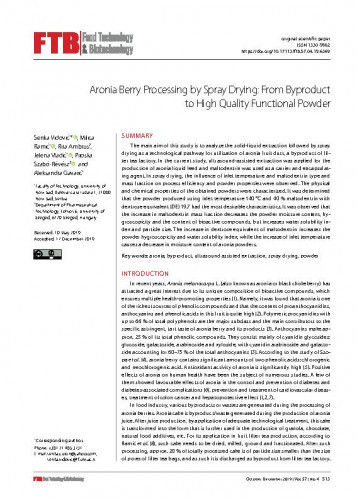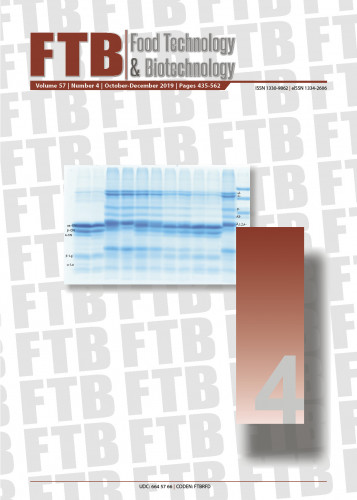The main aim of this study is to analyze the solid-liquid extraction followed by spray drying as a technological pathway for utilization of aronia fruit dust, a byproduct of filter tea factory. In the current study, ultrasound-assisted extraction was applied for the production of aronia liquid feed and maltodextrin was used as a carrier and encapsulating agent. In spray drying, the influence of inlet temperature and maltodextrin type and mass fraction on process efficiency and powder properties were observed. The physical and chemical properties of the obtained powders were characterized. It was determined that the powder produced using inlet temperature 140 °C and 40 % maltodextrin with dextrose equivalent (DE) 19.7 had the most desirable characteristics. It was observed that the increase in maltodextrin mass fraction decreases the powder moisture content, hygroscopicity and the content of bioactive compounds, but increases water solubility index and particle size. The increase in dextrose equivalent of maltodextrin increases the powder hygroscopicity and water solubility index, while the increase of inlet temperature causes a decrease in moisture content of aronia powders.; Svrha je ovog rada bila ispitati mogućnost primjene kruto-tekuće ekstrakcije i sušenja raspršivanjem za dobivanje praha aronije iz prašine nastale pri proizvodnji čaja u filter vrećicama. Pri proizvodnji tekućeg ekstrakta aronije upotrebljena je ekstrakcija potpomognuta ultrazvukom, dok je maltodekstrin korišten kao inkapsulirajuće sredstvo prilikom sušenja. Ispitan je utjecaj ulazne temperature sušenja, vrste i masenog udjela maltodekstrina na učinkovitost procesa i svojstva dobivenih prahova. Također su ispitana i fizička i kemijska svojstva dobivenih prahova. Ustanovljeno je da prah aronije dobiven primjenom ulazne temperature sušenja od 140 °C i inkapsulacijom s 40 % maltodekstrina dekstroznog ekvivalenta od 19,7 ima najbolja svojstva. Povećanjem masenog udjela maltodekstrina smanjili su se udjel vlage, stupanj higroskopnosti i udjel bioaktivnih spojeva, a povećali indeks topjivosti u vodi i veličina čestica praha. Povećanjem dekstroznog ekvivalenta maltodekstrina povećala se higroskopnost praha i indeks topljivosti u vodi, a porastom ulazne temperature sušenja smanjio se udjel vlage u prahu aronije.
Sažetak

 Food technology and biotechnology : journal of the Faculty of Food Technology and Biotechnology, University of Zagreb, Zagreb, Croatia : 57,4(2019) / editor-in-chief Vladimir Mrša.
Food technology and biotechnology : journal of the Faculty of Food Technology and Biotechnology, University of Zagreb, Zagreb, Croatia : 57,4(2019) / editor-in-chief Vladimir Mrša.